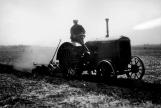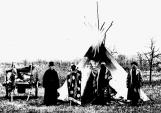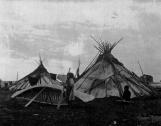14
Manitoba land grants document1882
Manitoba, Canada
 Credits:
Credits:Image courtesy of: Archives of Manitoba
15
Charlotte Macharey's (nee Miller) Trip to Manitoba in 18741 September 1928
Orangeville, Ontario to Winnipeg, Manitoba, Canada
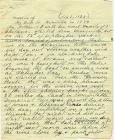
16
Memories of My Trip to Manitoba in 1874September 1, 1928
My mother and I with her small family of 5 children started from Orangeville, Ont. On the 15th of September reaching Owen Sound and embarking that we on the steersmen Ellen Smith one day out stormy weather which kept on and on reaching Lake Superior, it became very violent . We were days and half on the Lakes leaving the boat on Sunday noon at Thunder Bay, Monday morn we started on over the Dawson Route-that was a very pleasant voyage, for the storm was over and the sun shining bright all day, 50 miles by land in comfortable Democrat Wagons drawn by 2-team of horses and changed 3 times during the day, embarked on a small steamer that night, which did not start until morn we were one day going over that Lake, Shebandowen and rested at night sunset. Morn were taken to the river close by and packed into large open boats called York Boats and drawn by a small tug up the river. Another lovely day and this, our mode of travel for 6 days, passing the most enchanting scenery. Then we reached the Lake of the Woods we had stopped each night and a fresh start in the morning, we were a day sailing on the Lake of the Woods reaching the Nor West Angle in the eve, rested over Sunday.
The end of a glorious week starting again on Monday morn at 4 o'clock in the Democrat Wagon again driving until 7 a half hour for breakfast and to have the horses changed driving until 9 at night. Changing the horses 3 times and a half hour rest we reached Winnipeg, at 4 o'clock Tuesday afternoon, September 30, 1874. Making the quickest trip that had been made over the route, no rain and lovely moonlight nights and splendid men.
17
page 2 of ''My Trip to Manitoba in 1874'' by Charlotte Macharey (nee: Miller)1 September 1928
Orangeville, Ontario to Winnipeg, Manitoba, Canada
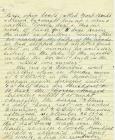
19
I know when we were ploughing one day, me and my bother was ploughing with the horses, we unearthed some pemmican. The Indians used to put it in a leather pouch and they used to bury it in the ground and it was ground up buffalo meat, that's what it was, and dried, they dried it somehow. And it would never rot, and we ploughed this up one day-this pouch, we didn't know what it was-then we opened it up, I don't know where we took it to now, but they told us that that's what it was, that it was pemmican. That the Indians had dried and ground up and buried it for future use. And I guess they never used it, or didn't remember where they put it, or what I don't know.And what year was that that you ploughed it up?
Oh, that would've been in the thirties. I can't remember what year but it'd be in the 30s, '37, '38, in and around there. Cause we got our first tractor in '42, maybe I said 1940, but it was '42 when we got our first rubber tired tractor.
So I wonder how long that pemmican had been under there?
I don't know, but it was just as good as the day they put in there.
Oh, did you sample a bit?
No, we didn't sample it, but there was nothing rotten, it smelt good and everything, like there was nothing rotten about it at all. But it was all ground up, it just looked like flour, only it wasn't white, I don't think, I think it was kinda brownish colour.
21
What does that mean? Métis, I am a prairie dweller person. That's where my roots come from. This is where this is where my ancestors… and for some reason I've inherited through my genes, through my blood or whatever certain talents that these people had to apply to their lively hood in order to exist. And I take all that knowledge that I was given as a gift and I put it down to where people can appreciate it and that's why you're here. so that I want people to appreciate what i know or what i have to share, so I think that's important, it shouldn't die.22
Ray Davis at the Prairie Reunion and Corn Roast20 August 2006
2795 Ness Ave, Living Prairie Museum, St. James, Winnipeg, Manitoba, Canada

23
Well, I was a product of the Depression. And we didn't have much chance for making any money except catch gophers, and gather crow's eggs and catch rats and all these kinds of things which were nuisances and the municipality used to pay a bounty for these things, one's tendency was to squirrel things away a bit just in case you might need it. Not that you'd skimp on your living. If I could put it this way, I think in many people it bred a notion of not living too high off the hog. Debt was a thing avoided. Mortgage was a bad word. Well let's live as well as we can, but maybe we don't need two or three cars, or a big TV….on the cautious side of what one does, is the core of the prairies, at least when I was growing up.25
The Bourke family that lived down on Ferry Road, and where the (St. James) Collegiate is now, and the community club, they have that, ah…nest of houses now…I forget the…the Bourkevale Community Club?
the Bourke…yeah…
and there's condominiums down there.
Yeah-condominiums. That was all a golf course. That was--they were Indians. They lived in tipis, they had three tipis, for a number of years, and then they got houses, they built houses-in fact, my dad helped them build. And, um, they were very nice people-really lovely people. And my mom used to bake for them, or make soup or whatever, because Mrs. Bourke wasn't very good at baking, cause she hadn't learnt to bake, like my mom had learnt to bake. They just had Trent, just the wee boy, he was about maybe ten years older than I was. And it was just him and the mom and dad and they lived there.
In three tipis?
Well they had people come, they used to have visitors come, so they had to have tents, They didn't have a garden or anything so Dad and Mom had the garden. So it…things went to them out of the garden and-baking as I say. They're very nice people and Mom loved her. Mom really loved her, she thought she was really nice person, because she helped Mom do things and Mom helped her do things, you know. The sewing, she learned to sew…
So she would give you clothes and things like that?
Yeah, Mrs. Bourke-she was a real sewer.
